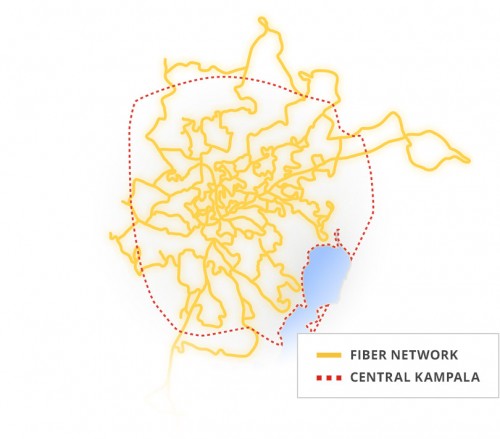Google’s Project Link to bring reliable (and hopefully more affordable) broadband to Kampala, Uganda
Google’s latest internet infrastructure project (on the heels of Fiber and Project Loon) is an urban fibre network for Kampala, Uganda that can be accessed by local internet providers to increase data rates at a lower cost to subscribers.
Bringing reliable broadband internet access to landlocked nations is not the easiest task around. Landing an undersea cable is one thing, but ensuring that capacity reaches inland areas across international borders is another story. Fortunately for those in landlocked Uganda, a new project is set to bring faster and more affordable internet services. The recently constructed fibre network, known as Project Link, will improve broadband infrastructure in much of Kampala (home to 1.6 million people). Project Link allows local ISPs and mobile operators to connect to a fibre backbone, which in turn connects to international capacity.
If all goes according to plan, Google’s Project Link should encourage lower wholesale internet costs among internet providers through increased competition. That is, Google will most likely nudge bandwidth costs downward in order to attract ISPs. Capacity will no longer be a limiting factor for internet adoption; instead the onus will lie on the operators to ensure reasonable access costs to consumers once their wholesale costs decrease.
Google emphasizes this project is not a solution to poor internet access, but an enabler for local providers to offer new internet or mobile data plans. Critics say Google is using such projects to attract new users for its array of products, many of which generate substantial revenue for the company. Economically, the move to offer super-cheap wholesale internet capacity to ISPs and mobile operators makes sense if Google can offset the cost by driving revenue from its products. But, the company is adamant it simply aims to empower local innovation from within Kampala.
Speaking to MIT Technology Review, the Google access field director for Project Link affirms that the goal of the project is to connect people to quality internet. He does not specify end-user costs or wholesale data costs to access the Google-owned fibre network. He does, however, mention that three ISPs plan on using the network when it goes live and up to ten in total may eventually purchase capacity.
For now, Google is waiting to see how the project works out for Kampala but is clearly trying to set an example for other telecoms infrastructure providers to follow. Project Link certainly won’t solve rural connectivity issues, but it’s a great start to target population-dense urban areas and test this business model. As Erik Hersman, expert on all things East African tech, puts it, “If they (Google) are able to engineer a reduction in prices, that’s huge.” After all, reliable internet also means more local innovation, education, and information sharing within Uganda and beyond.













 Twitter
Twitter Facebook
Facebook Pinterest
Pinterest